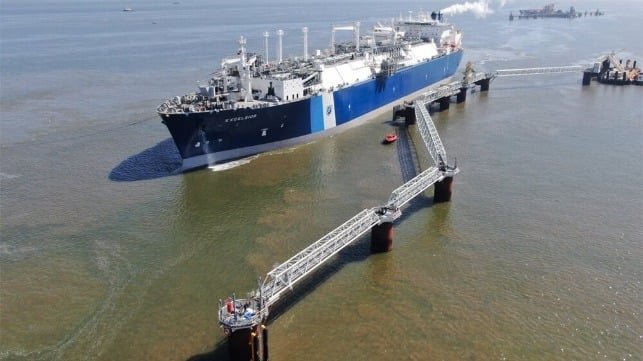Germany Continues to Expand LNG Imports with Arrival of Third FSRU Unit
Germany’s federally owned Deutsche Energy Terminal GmbH (DET) recently welcomed the arrival of its third Floating Storage and Regasification Unit (FSRU), marking a significant milestone in the country’s efforts to diversify its energy sources. The new FSRU, named Excelsior, is the second unit to be stationed at the port of Wilhelmshaven, highlighting Germany’s commitment to secure and reliable energy supply.
The decision to invest in LNG import projects was made in 2022 with the backing of the German government, in response to the need to reduce reliance on gas imports from Russia amid geopolitical tensions. The first LNG cargo arrived in Germany in January 2023, signaling the beginning of a new era in the country’s energy landscape.
Dr. Peter Röttgen, Managing Director of DET, emphasized the importance of LNG terminals in ensuring a stable energy supply, especially during times of crisis. With natural gas storage facilities depleting rapidly during the winter, the need for alternative sources like LNG has become more apparent than ever.
Unique Infrastructure at Wilhelmshaven
The construction of a specially designed terminal at Wilhelmshaven to accommodate the Excelsior FSRU showcases Germany’s commitment to innovation in energy infrastructure. The terminal’s island jetty in the Jade Stream, featuring a steel structure with no physical connection to the nearby dyke, demonstrates the country’s forward-thinking approach to energy logistics.
As the Excelsior prepares to become operational, it is expected to contribute significantly to Germany’s natural gas grid. With a storage capacity of 138,000 cubic meters of LNG, the vessel is poised to meet the energy needs of millions of households in the coming years.
Transitioning Towards Sustainable Energy
While LNG imports play a crucial role in Germany’s energy transition, the country remains committed to advancing renewable energy sources. The integration of FSRUs into the energy infrastructure is part of a broader strategy to achieve a more sustainable and resilient energy system.
Despite recent challenges, such as the termination of a charter for the FSRU Energos Power, Germany’s LNG import terminals continue to play a vital role in ensuring energy security. The data from the German Federal Network Agency reflects the growing importance of FSRUs in the country’s energy mix, with LNG imports steadily increasing.
As Germany navigates its energy transition, the arrival of the Excelsior FSRU heralds a new chapter in the country’s energy landscape, one that prioritizes security, sustainability, and innovation.

